“My bags were packed. A Lyft was literally on its way to take me to the airport so I could go to New York City.”
Morgan Parker and I are walking through the French Quarter in New Orleans, talking about the plans she had to attend the National Book Critics Circle awards in March of 2020. We are in town for a mutual friend’s birthday celebration, and it’s already been a magical weekend. Two nights before, when Morgan walked into a restaurant where a group of us were eating, I sprung up from my table and lifted her into the air—spinning her around as we hugged. Morgan lives in Los Angeles. I was supposed to see her when she came to New York City for that trip. Then I was supposed to head out to LA for a book festival, where I would have seen her again. Instead, this is our first time together in over two years.
It is a Sunday morning. City workers are washing last night’s party off of Bourbon Street as Morgan and I pass under the cast-iron balconies of the neighborhood’s Creole townhouses. During our walk we will stop at Felix’s Oyster Bar for a breakfast of seafood gumbo, red beans and rice with andouille sausage, and, yes, oysters. After our meal we will meander down to the banks of the Mississippi River, strolling through Woldenberg Park as we breathlessly catch up with one another. This trip to New Orleans is the first time Morgan has left Los Angeles since the pandemic started. I feel so lucky to be in the same place—the same physical space—as her. It’s wild how easily we can forget what a friend’s laughter sounds like.
Morgan Parker: A friend texted me, “Are you sure your flight isn’t canceled?” So I checked on my phone, and it had been. That’s when it got bad. For all of us.
I: Was the award ceremony also cancelled?
MP: It was. I found out that I won on Twitter. It was the day of the awards—March 12th, 2020—so nobody had figured out Zoom yet. They simply tweeted an announcement. But more importantly, nobody really knew what was happening with the whole world. So it was a very surreal moment. There I was, winning an award that I—at the time—never thought I could have won, while simultaneously the entire planet was grinding to a halt.
I: Holy shit, Morgan.
MP: I didn’t really know what to do, so I texted my agent, “Hooray?” And then things, of course, got so much worse. So much worse in so many different ways for so many of us. It took me a while to process, like everyone. But eventually I came back to that moment. I would have been there with my brother. I would have been in New York City. I would have been sitting in that auditorium, waiting to hear them say, “And the winner is… Jericho Brown, for The Tradition,” but they would have said my name. And I would have been in shock. But instead I was in Los Angeles, alone. Looking at a tweet.
I: Did you have people during the pandemic?
MP: My folks live close enough that eventually I could visit them. And I live in a cul-de-sac, so I got to know my neighbors. Plus Tommy Pico and a few other writers are within walking distance, so we all started seeing each other.
I: But you were living by yourself?
MP: Yes. And I live in a very isolating situation. But that is how—during normal times—I recharge from all the other bullshit. I’m used to being alone. So my reaction was to simply burrow in. Especially at the beginning. When I eventually did start seeing people, I was still extremely careful. Because, like I said, I was also seeing my parents. And I remember thinking, “If I get them sick, I will never forgive myself.”
I: Isn't it so interesting, now that we are moving into—whatever you want to call this next, messy phase—how easy it is to forget that feeling? But I remember having that exact same thought. “Sure, I don’t want to get sick. But Jesus, if I took someone else out?”
MP: Exactly. My being cautious wasn't about me. Which is why this never-ending bullshit with masks exasperates me so much. “Don't you care if other people live?” But, it turns out—for a lot of people in this country—the answer to that question is, “Not at all.”
I: You’re a National Book Critics Circle award winning poet.
MP: Thank you.
I: You also wrote Who Put This Song On?, a YA novel. And now you’re adapting that into a movie, correct?
MP: That’s right. Which has been a trip during all of this. Listen, to talk about work in general for a minute. I am always angry at linear time. It’s rude. And people are almost never patient with creators. But the pandemic put things on a whole other level. I’m speaking for so many of my friends in LA who are working on scripts, shows, etc. Or writers under book contracts. Or really anyone who had a job through all of this. Simply because you start a meeting with, “These are tough times…” that doesn't mean anything has changed. “These are tough times, but everybody’s still hitting their deadlines, right?” And I’m like, “C’mon, y’all.”
But yes. I’ve finished the screenplay. We’re waiting to hear back from the studio. There were so many drafts. So much heartache. So much therapy. Because we’re taking this script super seriously. I’m taking it super seriously. And not simply because it’s my life story, but because it’s about depression.
I: You want to be careful about how that's portrayed?
MP: It's a teen movie. I have a lot of strong feelings about the way that depression is portrayed in teen movies. It's often downright dangerous. And I’m the depressed person working on this script. So I need to make sure this isn’t simply, “She’s sad.” This character is going to be mean, at times. She’s going to be awkward. She’s going to lash out in certain—often inexplicable—ways. I want it to be an accurate portrayal of what it’s like to live with depression. To move through the world with depression.
So I’m trying to do that, while also revisiting some of the darkest moments in my life. While also trying to avoid tropes and clichés. While also trying to make an enjoyable film.
I: That’s a lot of responsibility.
MP: There's so much misinformation about depression. I want to be as honest as possible. So I have to find ways to make sure this story isn’t being watered down. Because young people—young people who might be struggling with depression, or who might not even understand what they themselves are going through—are going to watch this film. And I want them to feel better informed for having watched this film.
Often people try to figure out the “why” of depression. “Why are you sad?” There is no why. And there certainly ain’t thirteen reasons why, if you know what I’m saying. This story will not be centered on the “why.” The “why” is the depression. It’s a disease. And I get it. Asking someone, “What's wrong?” That’s natural. So it does take a lot to psychologically undo that impulse—the impulse to try and figure out what's wrong and then fix it. But psychologically it's extremely important that depressed people don't feel like they need to be fixed. Especially if that depressed person is a teen girl.
It’s tough. Obviously I still go to therapy. I still have my normal ups and downs. But I was surprised by how much working on this script took me back. There’s the living it. Then writing a book about it. Then touring all over the country with the book. Then working on the script. It’s like I have to explain that my life matters, over and over again. Explain that I'm not a freak. Explain that I have to take this medicine. Explain that I'm maybe not going to meet that deadline. It's a lot. Culturally, too. Black women always have to explain themselves, in any and every kind of way.
I: Often to an unhearing ear.
MP: I am someone who never got good at being vulnerable in front of people for all the aforementioned reasons. And now, in a way, that’s my job.
I: Touching on the difficulties of being a Black woman—and being a Black woman in America—I wanted to ask you about last summer’s protests. Did those give you any hope?
MP: I felt bad, to be honest. Because everyone was saying, “This is it. The time is now.” But I was thinking about 2012. And all the years before that—thinking about all the years, really. I mean, maybe this will be it, but forgive me if I'm not hopeful that this one moment is going to change everything. Because if that’s the case—if it’s about how badly we want change to happen—we could have done that for Trayvon. But nothing changed after Trayvon.
The young folks were out there, and that was uplifting. It’s always going to be powerful to march. To see people in the streets. People were really organizing. People in Los Angeles were doing—and continue to do—some really great work protesting the mayor and organizing their communities and calling out the gangs that exist within the LAPD. All of a sudden people were talking about police budgets in a way that didn’t seem to be happening before. So there has been a lot of good going on, don’t get me wrong. But on the other hand, you watched capitalism do its thing and do its thing mighty fast.
I: The corporate co-opting, you’re saying?
MP: You see a Blue Shield commercial saying, “Black Lives Matter.” And I’m like, “If our lives matter, why is healthcare in this country so expensive?” It simply made me feel rancid. I got an email from Doc Martens. Again, “Black Lives Matter.” And I’m saying, “Okay, Doc Martens. But can I get a discount? Because I opened this email thinking it was going to be about a sale.” Instead it’s some hollow statement from a shoe company. And every company on the planet was doing that.
I was teaching at the time, and all of these faculty members were trying to figure out the language for an email to send to the students. And I’m sitting there thinking, “You don't have to take two days to go over an email. To tease out the messaging. You could simple check on these kids. Ask them how they’re doing. Give them space to talk about what they’re feeling.” Which is what I did in the classes I was teaching. Give these young people a space to air their grievances. And to also not make them feel like it’s all on them. Because that’s the other thing I worry about. I’m here saying, “the young people are leading the protests,” but at the same time it shouldn’t be on them to do that.
So yeah, I guess my answer is… I don’t know. I'm already so world weary. But definitely fuck the corporate messaging. If all these corporations really thought that “Black Lives Matter,” the world would look a lot different, you know?
I: You also had those stories about white people ordering all of these anti-racist books—buying them online from independent bookstores—and then many folks not even showing up to pick up the books.
MP: So many people are out here saying, “I'm an anti-racist.” And I’m like, “But are you?” Because meanwhile, as a Black woman, things are still really hard for me. Really basic shit. I’m walking my dog, and people bump into me. Don’t even notice me on the street. Or they’re expecting me to be the one that swerves out of their way. So it’s very hard to remain hopeful. And it always has been. I’ve spent much of the pandemic simply researching the past. Reading about 1969 and the Panthers and different Black radical ideals from that time. There was so much possibility, and comparing it to today—
I: How different it was then compared to now?
MP: No. How the same it feels. Which is very sad, in a way. Always on the cusp of hope. The cusp of change. Even the slogans feel similar. “Black Lives Matter,” to be honest, always hurts my feelings a little bit. Because it's acknowledging the opposite, you know? It makes room for the opposite. And I’m saying, “Duh. Why do we have to say that? I knew that already.”
I: And the same could be said for “Black Is Beautiful,” from the 1960s. Sort of, “I agree with this statement, but by saying it there's the implication of the opposite.”
MP: Exactly. During that time there was a lot of attention on Black power and Black affirmation. Self conviction, self-stating, etc. Allowing the Black experience to be spoken by Black people. And then that really got squashed. Really got co-opted. That's the repetition I see. It’s happening again today. The message is getting flattened. And that’s scary. The president is different, sure. But nothing else really is. At the end of the day all we got was a different mayonnaise sandwich in the White House.
I: Has it felt good to see so many friends this weekend? Or has it felt overwhelming?
MP: It feels good. Really good. The only thing that feels weird is that it’s been so long, you know? You can simply be vibing with someone and then suddenly remember, “Oh, I haven't seen this person in two years.”
And that’s true for everyone. We all haven’t seen each other. And I think the fact that it’s been this famine for everyone makes everything a lot more dramatic. And a lot more beautiful. And a lot more exhausting. And a lot more wonderful. All of it.
I: You’re originally from California, but lived in New York City for eighteen years. How does it feel to be in LA now?
MP: Well, one of the reasons I moved was I always thought I’d be able to come back and visit New York whenever I wanted to. Obviously the pandemic had different plans. Publishing is in New York. So many of my people are in New York. My history is in New York. The reason I was able to convince myself to move is because I figured whenever I was missing New York, I could simply go back there.
So I’ve been really missing NYC. Last year I stopped watching Law & Order because it made me too sad. No joke! I had to try and get into weird shows that took place in LA, because watching Law & Order had me like, “I know that street. I know that corner. I broke up there once. I know that subway stop. I’ve vomited there. And there. And there.” It was too much.
But I do love LA. I have found my LA shows. But what I’ve really fallen in love with is how much LA loves its sports teams. Everyone is a Dodgers fan. Everyone is a Lakers fan. I saw purple and gold balloons outside of a weed store the other day. There was no reason to celebrate. They simply had Lakers balloons in front of the weed store, and that's Los Angeles. I really love the camaraderie that comes with that.
I: So you feel at home there, and you go to New York to visit?
MP: They’re both my home. New York will always be a home.
I: You haven’t been to visit since before the pandemic, correct?
MP: Not since I cancelled that Lyft in March, 2020.
I: When you do visit, what will you do first?
MP: Tip-Top Bar and Grill. Tip-Top is my first stop, and then I would walk around New York for the entire day. Simply looking at the city and visiting my peoples.
I: Why Tip-Top?
MP: Thinking about that place makes my heart warm. Also, I wonder about the old folks. I wonder if those old people—those regulars—if they’re okay.
I: I’ve been lucky enough to feel that relief a lot, recently. Walking into a bar and seeing an old regular. They look up from their crossword puzzle or sudoku or whatever and give you a grumpy, “Hello.” And you’re like, “Whew. They made it.”
MP: There's an old guy at Tip-Top who always wears a baseball cab—he looks exactly like one of my uncles, I swear to God. He supposedly watches the door, but he’s always sitting there. I wonder about him. Is he ok? Or Aunt Sally, who makes the chicken? Are all of these older people ok?
I: Are you at the point where you’re making plans for the future? Or are you just getting by?
MP: With the script finished, I haven’t really started dreaming up the next project yet. There are some things bubbling a bit, but what’s most important for me is opening up that head space. Allowing room for the idea of what comes next. Finding that thing that cracks open my creative brain again and gets those juices flowing.
Also, I want to get better at celebrating myself. Even simply saying out loud, “Good job, Morgan.” Finding little places to celebrate myself. Buying plants. Taking care of my plants. Celebrating my home, which I now refer to as the “Morgan Parker House: Museum and Library, Bar and Lounge, and Botanical Gardens.” That last part is new because I got so into plants during the pandemic. Celebrating my dog. Being grateful to be here.
I: Did you get a trophy when you won the National Book Critics Circle award?
MP: I did. They mailed it to me. It’s so dope. And I’m so glad it was Magical Negro that won. Because that’s on it. “Morgan Parker, Magical Negro.”
I: Now I’m picturing the engraver hesitating like, “I’m… ok, the title is… We’re sure? Yeah? We’re positive? We’ve triple checked this?”
MP: So funny. “The Magical Negro, 2019.”
I: Well, I hope when you do visit New York you bring that NBCC trophy with you. We can throw you a little party.
MP: Let’s throw me a little party! Because that’s what I want. More celebrating. I have to get a lot better at finding ways to celebrate things when there is no celebration. Or celebrating things that I missed. Because that’s how it felt. It felt like I was waiting for that Lyft in March, 2020. And the flight was cancelled and the NBCC awards were cancelled. And I simply turned around with my luggage and went inside for two whole years. Never put clothes on again!
That’s why this trip to New Orleans feels so important. When I was leaving LA to come here I said to myself, “Welp. Finally going on that trip. We’re closing the loop. That Lyft is on its way again. Hopefully this time I won’t have to cancel it.”
Morgan and I continue our walk, making our way back up Poydras Street, past Lafayette Square, and toward her hotel. We talk about tattoos—she got one last week that reads, “I must become a menace to my enemies”—music—she’s been listening to a lot of vinyl recently, and bought records at Beckham's BookShop the day before, including “this weird Ishmael Reed with a jazz band record. It’s poems from Conjure, I think?”—and her dreams for what the Who Put This Song On? movie soundtrack will look like—dreams that aren’t for sharing publicly, quite yet.
We hug goodbye. Morgan is staying in New Orleans for a few more days, while I’ll be catching a flight out that afternoon. Linear time is rude, I think to myself as I head out of her hotel and back across town. But it also carries us forward. To whatever comes next. Some day soon, probably early next year, I plan to be headed out to Los Angeles. Where I’ll hopefully be lucky enough to share physical space with Morgan Parker again.





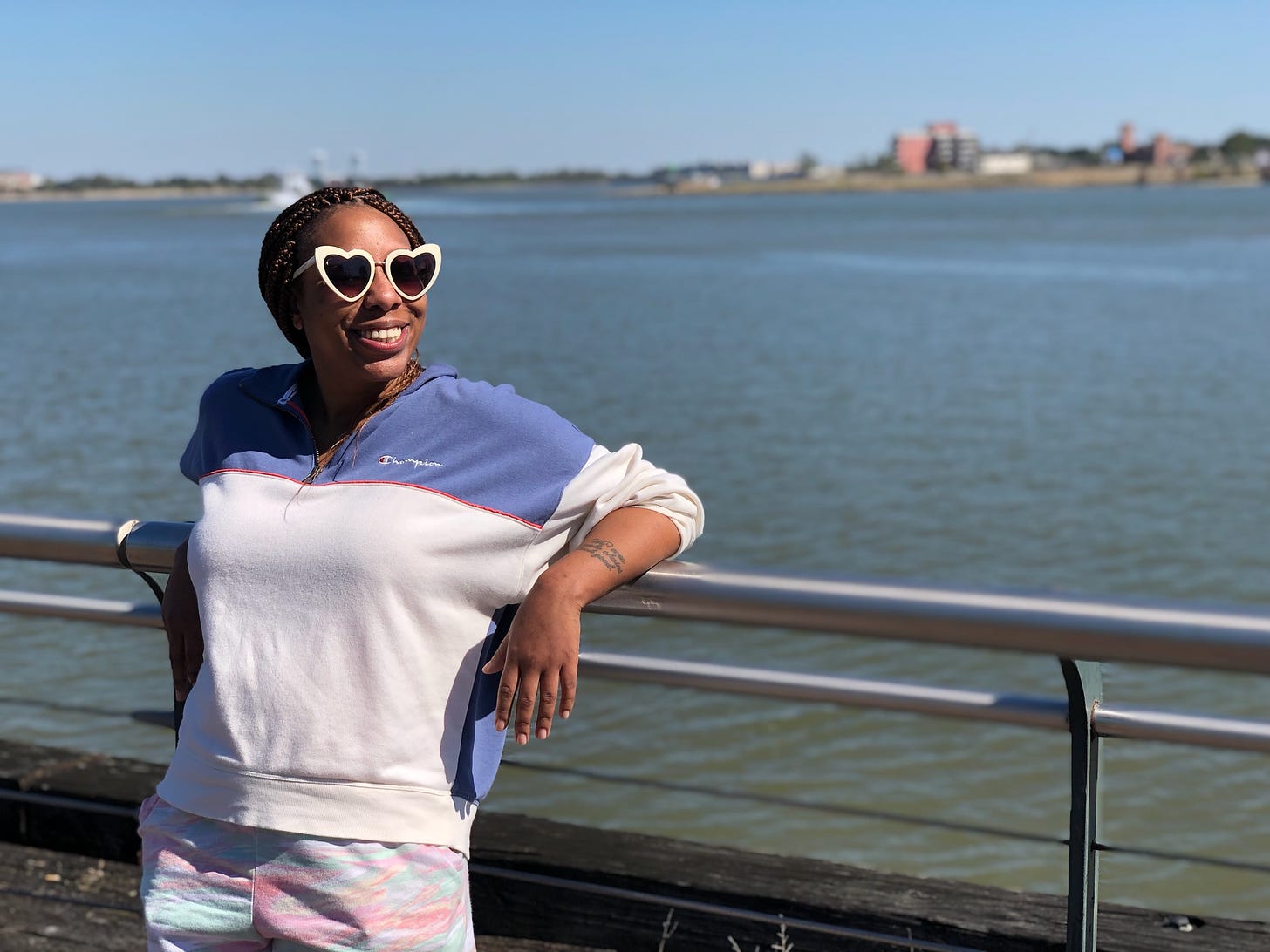
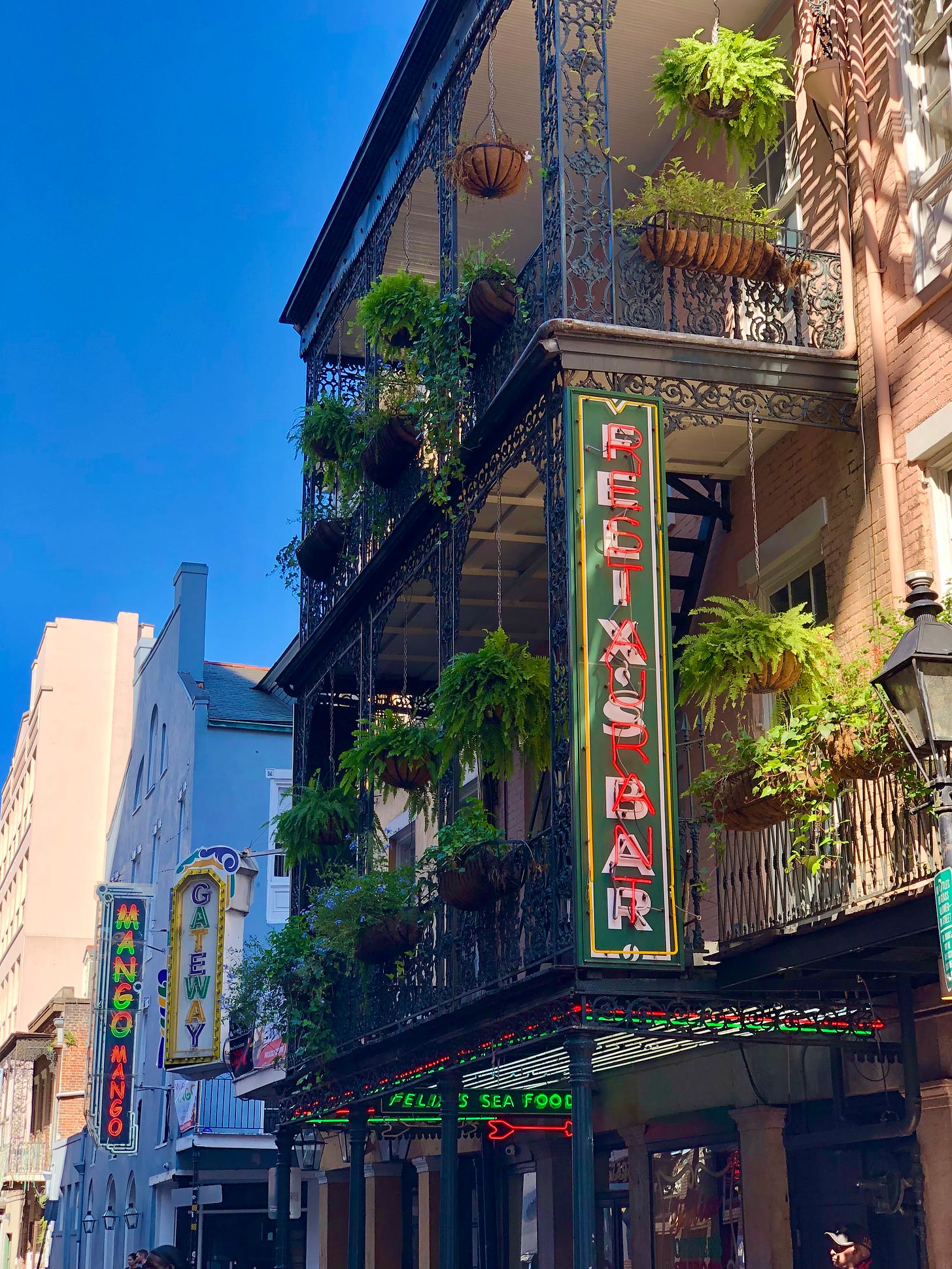
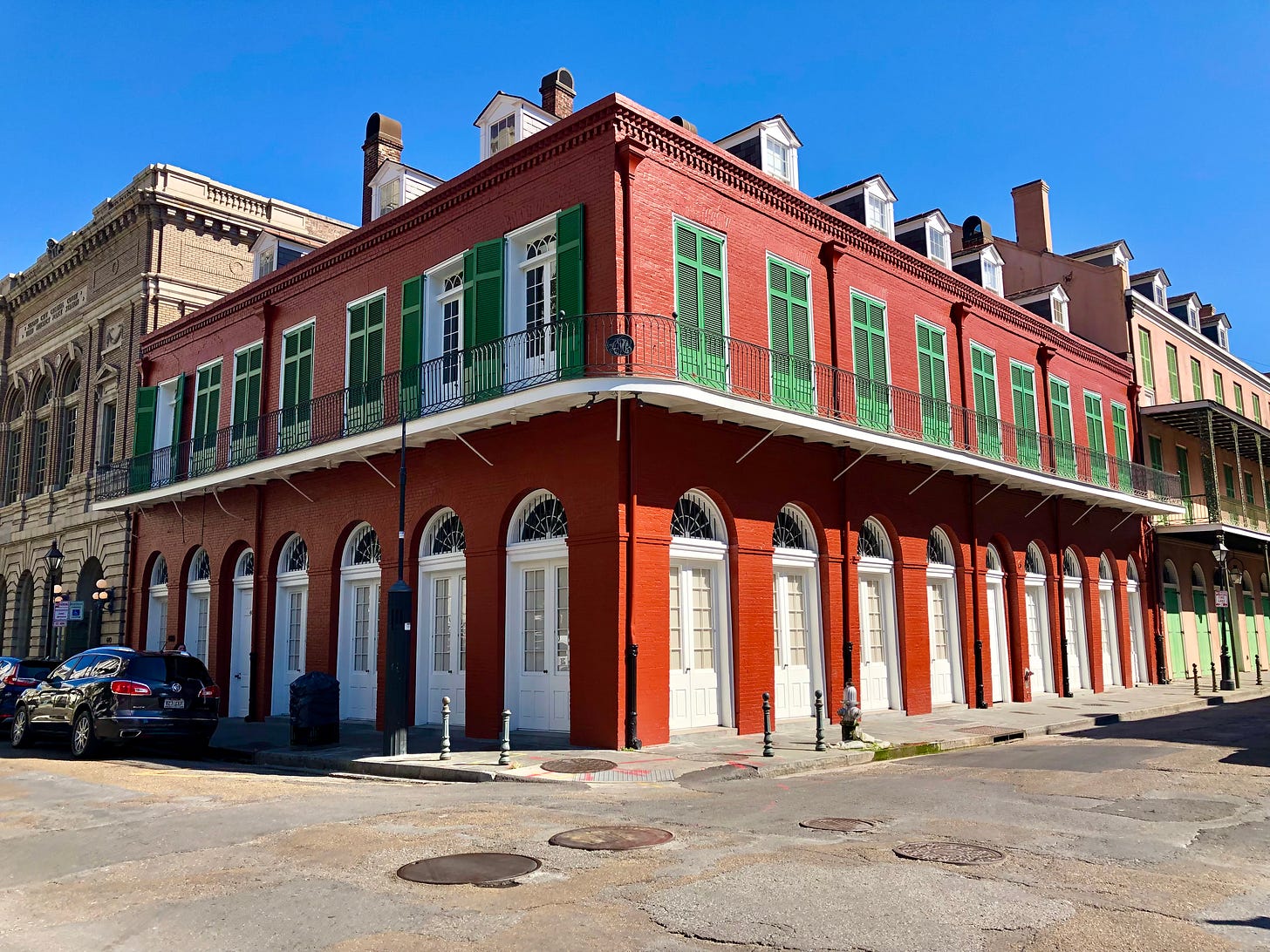
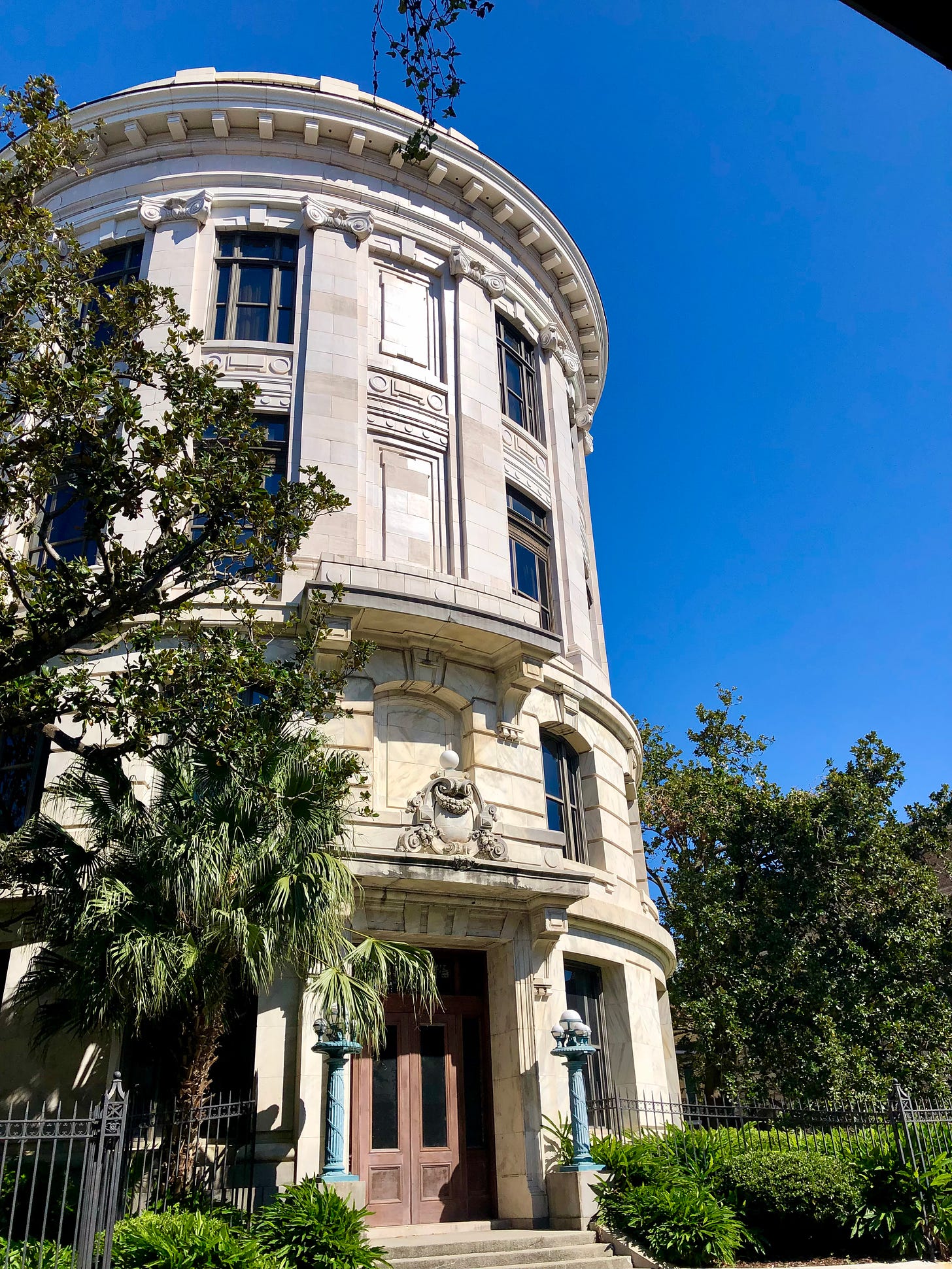
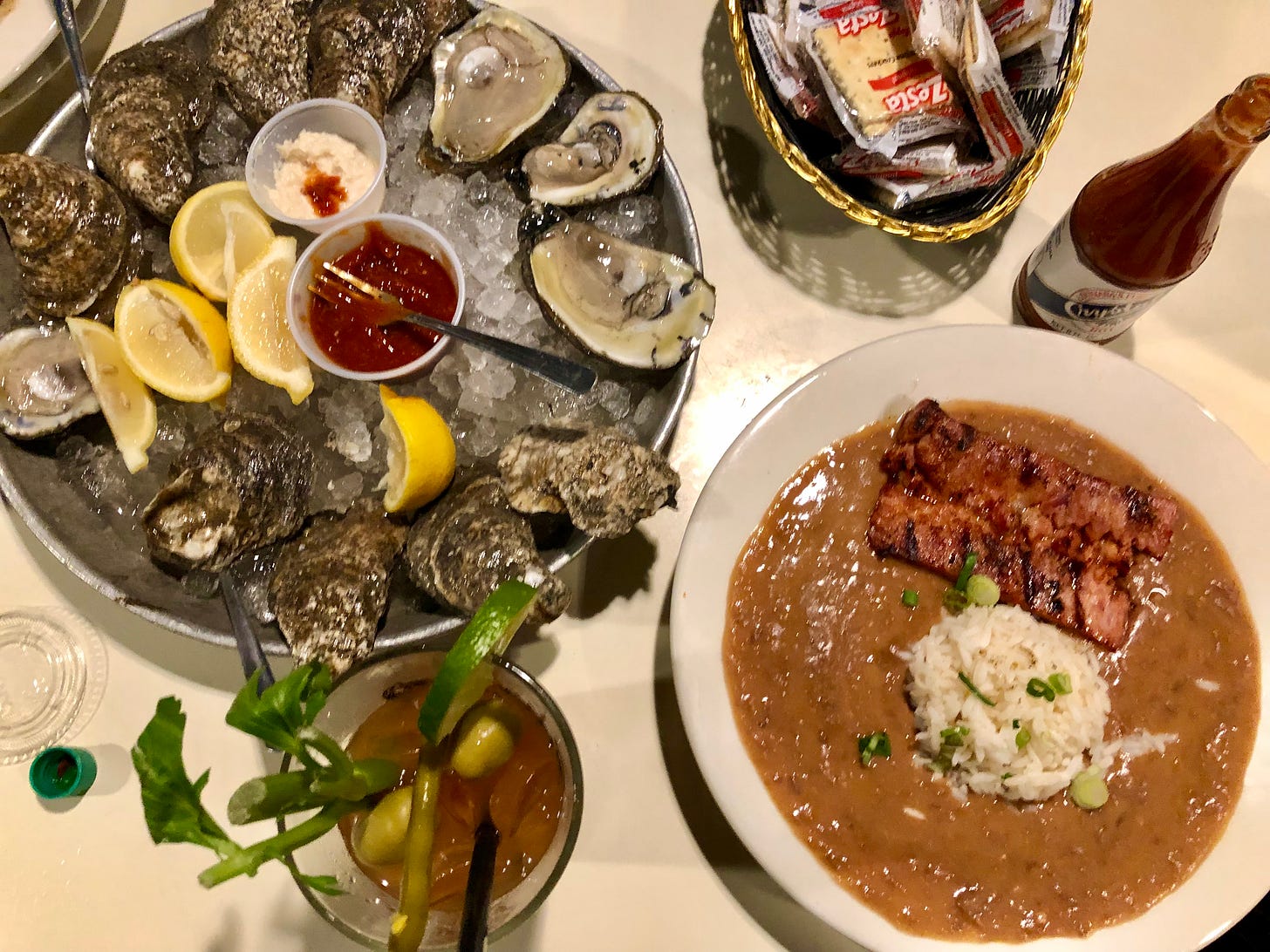
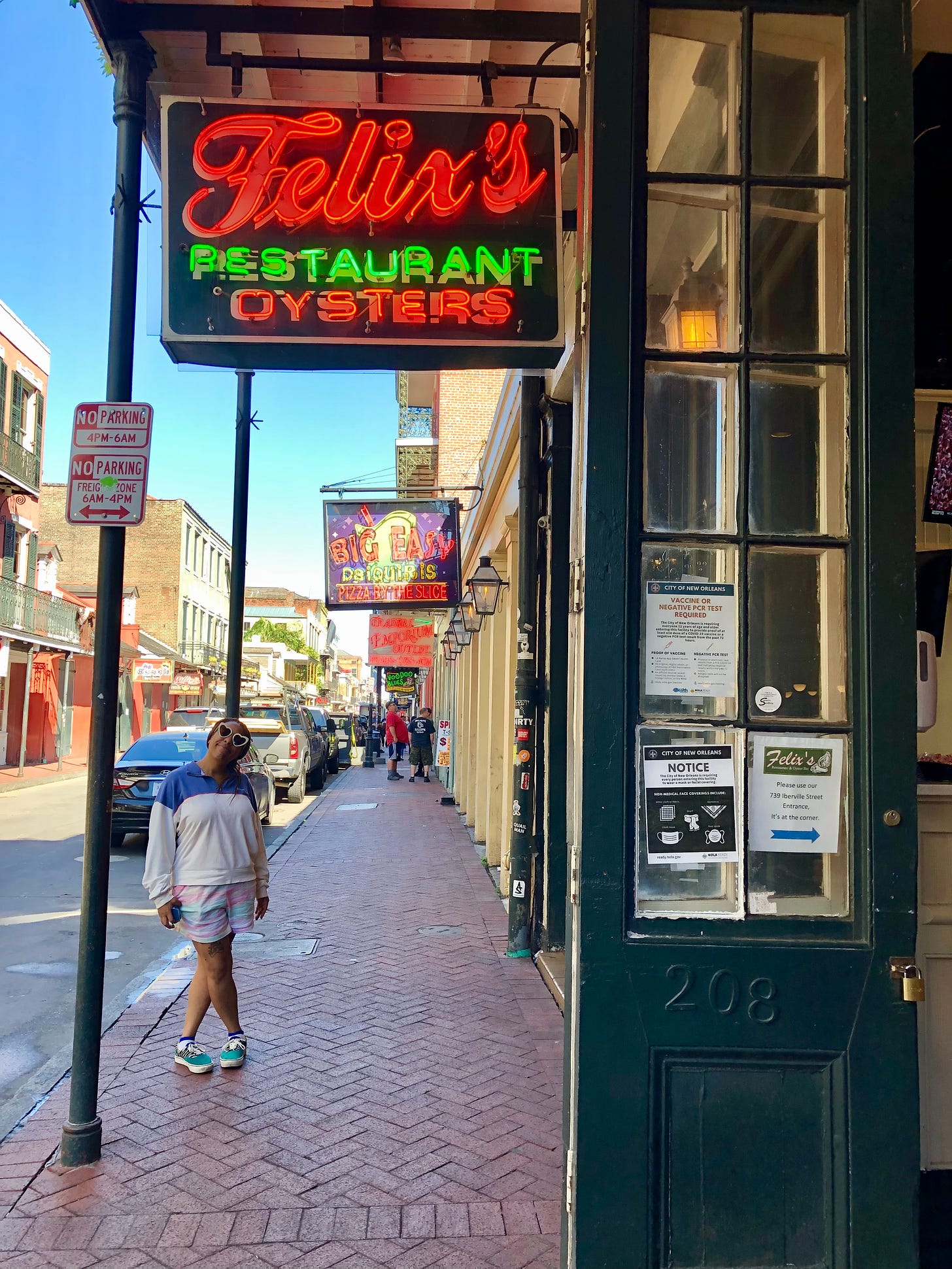

Good job, Morgan! And Isaac too. Lots to celebrate!